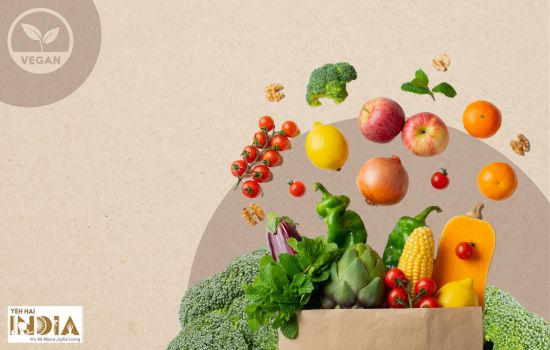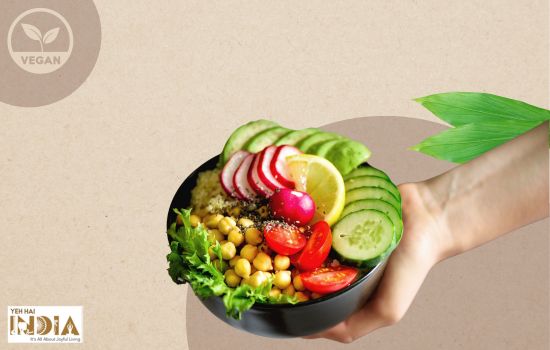The vegan diet has been gaining immense popularity in recent years as more people are embracing plant-based eating for various reasons. Whether it concerns animal welfare, environmental consciousness, or potential health benefits, people are opting for a vegan lifestyle.
Whether you’re curious about the vegan lifestyle or ready to make the transition, this guide will serve as your go-to resource for understanding and adopting a vegan diet.
What is Vegan Diet?
A vegan diet is a plant-based dietary regimen that eliminates all foods that come from animals. It focuses on eating fruits, vegetables, legumes, grains, nuts, and seeds. Veganism is different from vegetarianism, which allows the use of dairy, eggs, and other animal by-products, and firmly prohibits all types of animal exploitation and cruelty.
Vegan Diet and Environment
The vegan diet strives to lower the carbon footprint and conserve natural resources from an environmental standpoint.
Individuals can actively contribute to preventing the effects of climate change and conserving the world for future generations by adopting a vegan way of life.
Animal farming is one which contributes significantly to greenhouse gas emissions, water pollution, and deforestation.
Veganism’s values are profoundly established in ethical, environmental, and health concerns. Vegans often choose this lifestyle to promote compassion and minimise animal suffering.
To take a stand against animal exploitation and suffering by refraining from eating meat, dairy, eggs, and other animal-derived components.
Recommended Article: Top Weight Loss Diets In India
Vegan Diet and Nutrition

Several scientific studies have found that plant-based diets high in fruits, vegetables, whole grains, and legumes can provide a variety of health benefits.
In terms of health, a well-planned vegan diet can supply all of the nutrients required for optimal well-being.
A vegan diet that is well-balanced can help reduce the risk of chronic illnesses like heart disease, type 2 diabetes, and certain types of cancer.
They often include less saturated fat and zero cholesterol while containing more fibre, vitamins, minerals, and antioxidants.
However, there are a few considerations to keep in mind from a nutritional perspective. It’s important to address these potential drawbacks to ensure a balanced and healthy vegan lifestyle.
A potential drawback of a vegan diet is the risk of certain nutrient deficiencies. Since plant-based foods may not naturally contain certain nutrients found in animal products, careful attention must be paid to ensure an adequate intake.
Some nutrients that may require special attention include vitamin B12, iron, calcium, omega-3 fatty acids, and protein.
- Vitamin B12 deficiency is common among vegans since it is primarily found in animal-based foods. To meet their needs, vegans should consider taking B12 supplements or consuming fortified foods.
- Plant-based proteins may be lower in certain essential amino acids compared to animal sources, so it’s important for vegans to consume a variety of protein-rich plant foods.
- Iron and zinc absorption can be lower from plant-based sources, but incorporating iron-rich plant foods with vitamin C-rich foods and including zinc-rich foods is beneficial.
- Plant-based sources of omega-3 fatty acids may not provide active forms (EPA and DHA) as efficiently, so vegans may consider algae-derived supplements or fortified foods to ensure adequate intake.
By being mindful of these potential nutritional considerations and incorporating a variety of plant-based foods, vegans can optimize their nutrient intake and enjoy the benefits of a well-planned vegan diet.
Recommended Article: Ayurvedic Diet: 10 Rules To Stick To For Disease-Free Life
Simplify Your Plant-Based or Vegan-Diet Journey
To ensure you meet your nutritional needs and enjoy a variety of delicious meals, effective meal planning is essential.

Here are some tips to help you simplify your plant-based journey and create a well-balanced and satisfying vegan meal plan:
- Plan ahead of time and set aside time each week to plan your meals.
- Start by being acquainted with vegan basics such as whole grains, legumes, nuts, seeds, fruits, and vegetables. This will form the foundation of your meals.
- Incorporate a variety of vegetables, fruits, grains, legumes, and plant-based protein sources into your meals. This will ensure a wide range of nutrients and lower the risk of deficiencies.
- Prioritise meal prep to save time and assemble meals faster on hectic days.
- Experiment with different cuisines and flavours to keep your meals interesting by using cookbooks or online recipes and cooking techniques.
- Stock up on healthful vegan snacks like fresh fruit, raw nuts, homemade energy bars, and veggie sticks with hummus. This will help you avoid cravings and keep you full between meals.
- Be on the lookout for animal-derived components in processed meals.
- Learn about popular non-vegan ingredients such as gelatin, honey, whey, and casein.
- Read labels to make informed choices.
- Focus on critical nutrients such as vitamin B12, omega-3 fatty acids, iron, and calcium. To meet your requirements, consider fortified foods or supplements.
- Include a source of protein, such as tofu, tempeh, lentils, or chickpeas, as well as a variety of colourful vegetables and whole grain or starchy vegetables, such as quinoa, brown rice, or sweet potatoes, in Balanced Meals.
- Don’t forget about healthy fats like avocados, almonds, and seeds.
Navigating Challenges: Practical Tips for Beginners

As a newbie, embarking on a vegan diet can provide its own set of concerns and obstacles. Dining out or managing social settings may necessitate a little more work and planning.
These obstacles, however, can be addressed with the proper tactics. Here are some pointers to help newcomers through similar situations:
1. When dining out, it’s helpful to research vegan-friendly restaurants in advance or check menus online. We even have apps and websites and like HappyCow, which can be a valuable resource for finding vegan-friendly restaurants nearby.
2. And if you do not have access to these, nowadays many food places offer vegan options, in case of unavailability, you can request modifications to dishes to make them vegan-friendly.
3. When participating in social gatherings, informing your friends and family about your dietary choices ahead of time can help them accommodate your needs.
4. You can offer to bring a vegan dish to share and discussing your reasons for choosing a vegan lifestyle in a non-confrontational manner can help foster understanding and support.
5. As with any dietary change, ensuring nutritional adequacy is essential. It’s important to consume a variety of whole plant-based foods to meet your nutrient needs. Including sources of protein (legumes, tofu, tempeh), iron (leafy greens, lentils), calcium (fortified plant-based milk, leafy greens), and omega-3 fatty acids (flaxseeds, chia seeds) is crucial.
6. Consulting a dietitian or nutritionist with expertise in vegan nutrition can provide personalized guidance.
Listen to Your Body
Pay attention to how your body responds to the new changes you have adopted in your diet. Some individuals may respond well to the acquired changes and some may not.
A few signs further require adjustments, like incorporating nutrient supplements of vitamin B12, calcium or iron if deficiencies arise.
Being attuned to your body’s signals and seeking professional guidance when needed is important for long-term health and well-being.
KEEP THIS IN MIND!
Remember, transitioning to a vegan diet is a journey, and it’s normal to face challenges along the way.
By planning ahead, being open with others, and seeking support when needed, beginners can successfully navigate social situations and maintain a nutritionally balanced vegan lifestyle.
Remember to listen to your body, be flexible with your meal plan, and enjoy the process of discovering new flavours and nourishing your body with plant-based foods.
By incorporating the above-mentioned tips into your vegan routine, you can make the transition to a vegan diet easier and more enjoyable.
Embrace the power of plant-based meal planning for setting the foundation of a balanced and satisfying life!
Recommended Article: Veganism- How are Indians adapting to this diet?
Sources:
- Reed M, et al. (2019). Nutritional considerations for plant-based diets.
- Winston J, et al. (2019). A guide to vegan meal planning and prepping.
- Melina V, et al. (2016). Position of the Academy of Nutrition and Dietetics: Vegetarian Diets.
- Craig WJ, et al. (2009). Health effects of vegan diets.
- Mariotti F. (2019). Plant protein intake and dietary diversity in vegan and omnivorous runners.
- Le LT, et al. (2020). Veganism and Its Relationship with Insulin Resistance and Intramyocellular Lipid.
- Dinu M, et al. (2017). Vegetarian, vegan diets and multiple health outcomes: A systematic review with meta-analysis of observational studies.
- Burdge GC, et al. (2018). Conversion of alpha-linolenic acid to longer-chain polyunsaturated fatty acids in human adults.










